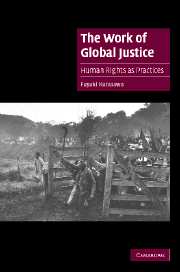Book contents
- Frontmatter
- Contents
- List of figures
- Preface
- Introduction: Theorizing the work of global justice
- 1 A message in a bottle: on bearing witness
- 2 The healing of wounds: on forgiveness
- 3 Cautionary tales: on foresight
- 4 The stranger's keeper: on aid
- 5 Cosmopolitanism from below: on solidarity
- Conclusion: Enacting a critical cosmopolitanism
- References
- Index
- Cambridge Cultural Social Studies
Introduction: Theorizing the work of global justice
Published online by Cambridge University Press: 01 December 2009
- Frontmatter
- Contents
- List of figures
- Preface
- Introduction: Theorizing the work of global justice
- 1 A message in a bottle: on bearing witness
- 2 The healing of wounds: on forgiveness
- 3 Cautionary tales: on foresight
- 4 The stranger's keeper: on aid
- 5 Cosmopolitanism from below: on solidarity
- Conclusion: Enacting a critical cosmopolitanism
- References
- Index
- Cambridge Cultural Social Studies
Summary
Setting the scene
At the dawn of the twenty-first century, the legacy of the previous one weighs heavily upon us. The ‘age of extremes’ (Hobsbawm 1994) was marked by great accomplishments, but also by a series of catastrophic developments that in many ways defined our present relationship to it: totalitarianisms of the Left and the Right, war, ecological degradation, genocide, widening North–South disparities, grinding poverty, and so on. The litany is a familiar one, not least because the end of the twentieth century was punctuated by ongoing civil wars, the reproduction of structural inequalities, famines and widespread crimes against humanity in the former Yugoslavia and Rwanda.
Predictably, this predicament has given rise to two sorts of response from progressive quarters. Many are falling prey to a fatalistic Zeitgeist, which is itself spawning positions ranging from stoic resignation about the state of the world to a weary and disillusioned cynicism about emancipatory projects, and even a kind of nihilistic despondency. There is indeed little doubt that recent tendencies – the hegemony of neoliberal capitalism, the clash between rival brands of politico-religious fundamentalisms and the assertion of a US-led ‘war on terror’, or the continuing ravages of the HIV/AIDS pandemic in the global South – only seem to justify the mood of despair. Furthermore, one of the great paradoxes of our epoch originates out of the disjuncture between the multiplication of human rights discourses nationally and globally, on the one hand, and the unrelenting violation of such socio-economic and civil-political rights, on the other – often by the very same actors who drape themselves in humanitarian rhetoric (Chomsky 2003; Teeple 2004).
- Type
- Chapter
- Information
- The Work of Global JusticeHuman Rights as Practices, pp. 1 - 22Publisher: Cambridge University PressPrint publication year: 2007

